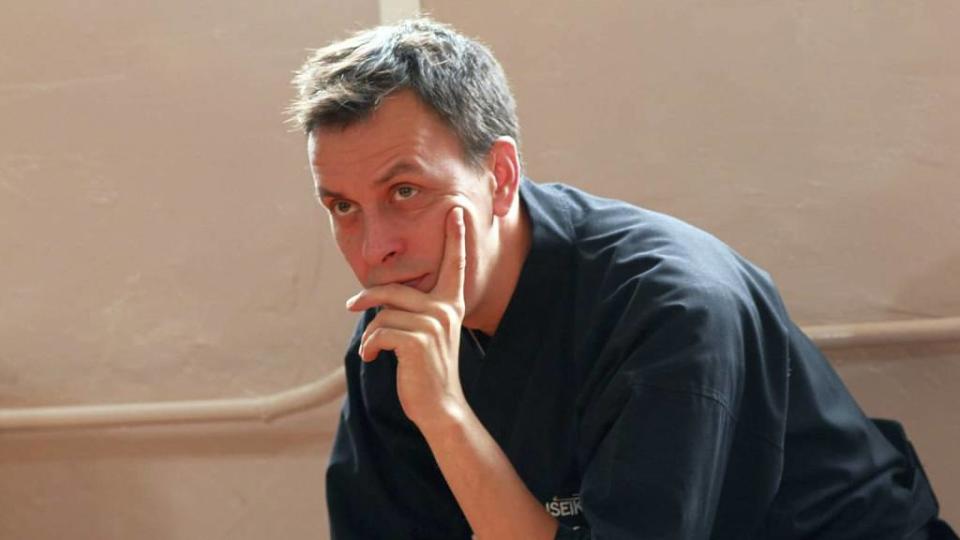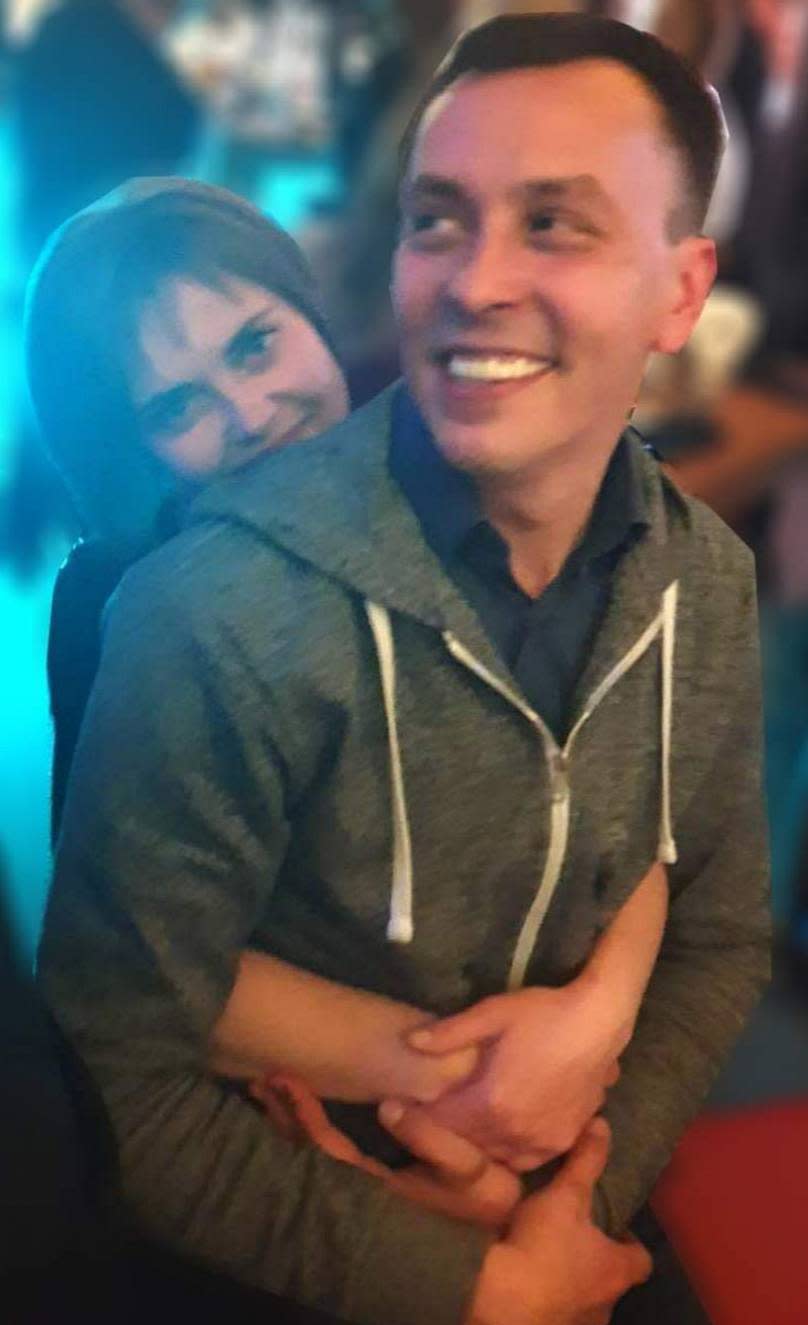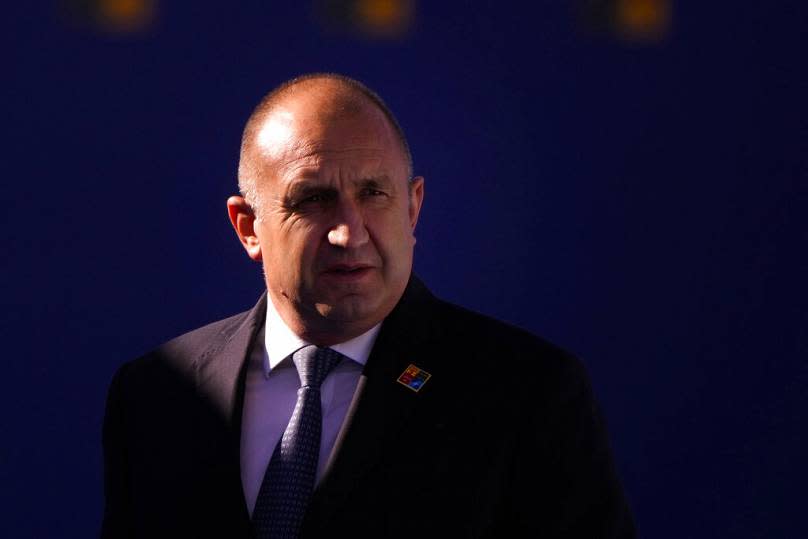Alexey Alchin: Bulgaria risks violating EU principles over Russia extradition request

When he moved to Bulgaria in 2014, all Alexey Alchin wanted to do was open a dojo where he could teach his favourite martial arts to children.
After publicly burning his Russian passport in Varna in late February in protest over Russia's full-scale invasion of Ukraine, Alchin found himself in detention amidst extradition demands from his home country. His case threatens to set a dangerous precedent that would see opponents of President Vladimir Putin's regime being extradited from the European Union.
The Balkan country of almost seven million people would be the first EU member state to hand over a Russian national since the beginning of the invasion, despite legal and human rights experts warning that Moscow is using trumped-up charges against Alchin as a way of testing the bloc's resolve in protecting Kremlin critics abroad.
After Alchin's act of defiance in Varna, it took the authorities in Moscow mere months to set up a case against him and reach out to Sofia, claiming that he defrauded the state by failing to pay outstanding VAT debts amounting to more than 282.5 million roubles (€4.5m) in late 2015.
A former entrepreneur in the field of metal exports, the 46-year-old Alchin rejected the charges, insisting he had proof that his books were in order when he left Russia for Bulgaria eight years ago. He also said he knew nothing of the court case against him, which Moscow claims goes back to 2018.
The Bulgarian Ministry of Internal Affairs reached out to him in late June, stating that there was an international warrant for his arrest and inviting him in for an interview. Alchin spent 12 days in detention and has been under house arrest since.
Meanwhile, the authorities in Varna decided to go along with Moscow's request, denying Alchin's request for political asylum in the process.
The District Court in the popular resort city, found on the Black Sea, ruled on Monday that Alchin should be extradited and has placed him in detention pending appeal.
"Alexey is doing his best to be okay in these circumstances," his wife Olga Gyurova told Euronews.
"He was asked to help one of the newer inmates. [The new inmate] is Ukrainian, and he is terrified of being in prison, so Alexey offered to help people and care about others."
"Even in his circumstances, it is easier for him to care about others than about himself."
Dissonance between nostalgia and reality
Alchin and Gyurova met in Bulgaria and had what she describes as a comfortable environment amongst like-minded people while also benefitting from a soft spot most Bulgarians have for Russia.
The historical closeness between the two nations stems from a number of connections, such as both having an Eastern Orthodox religious majority to both countries being a part of a wider eastern European Slavic cultural space.
The two were politically close, too. After World War II, Bulgaria was a part of the Stalin-led communist bloc and remained a loyal ally to the Soviet Union until the fall of top functionary Todor Zhivkov in 1989 and the first multi-party elections in the following year.
This, coupled with Bulgaria being relatively low-cost compared to most parts of Russia, led to many Russians flocking the coast for summer holidays to places like Varna, with some eventually settling there.
"The Russian minority has grown a lot because there are many people who moved [to Varna] from Russia with a one-way ticket, to put it that way," Gyurova said.
"10-15 years ago, Russians perceived Bulgaria as a country where you can buy an apartment and from time to time come here for a couple of weeks. It was quite cheap for Russians: cheap real estate, cheap services, cheap tickets, so it was not a problem to just buy a ticket and come here whenever you want."
However, despite Bulgarians welcoming her compatriots with open arms, Gyurova believes that there is a dissonance between the way ordinary Bulgarians perceive Russia and what the country has turned into under Putin.

"A lot of Bulgarians, when they learn where Alexey and I are from, they express a nostalgia towards Russia," she said.
"They immediately mention their experiences visiting Russia some 40 years ago, for example. They have no idea about what happens in Russia nowadays, and they have a traditional way of perceiving everything connected to Russia."
"And I have no opportunity to explain that nowadays, Russia has nothing in common with what they are used to thinking it is."
For these Bulgarians, it is almost impossible to comprehend that some are now fleeing the Putin regime, which continues to suffocate dissenting voices, most recently criminalising any form of criticism of the war in Ukraine — which it refuses to call an out-right war.
Arrested for one thing, put on trial for another
Merely calling Moscow's aggression against its western neighbour what it is — a war — instead of using the Kremlin-preferred term "special operation" can land you in prison for several years.
Many prominent critics of the regime, like opposition politician Vladimir Kara-Murza, have been arrested for basic infractions and then put on trial for other alleged crimes.
Kara-Murza was arrested in mid-April for "disobeying police orders". Although he relies on a cane to be able to walk -- a consequence of two failed poisoning attempts against his life — Kara-Murza was alleged to have "walked erratically and aggressively in front of police officers" in downtown Moscow.
He was charged on 22 April for "spreading false information" after he denounced the war in Ukraine in front of the Arizona House of Representatives on 15 March.
Finland and Estonia call for EU ban on tourist visas for Russians
Russians defy crackdown to find small ways of protesting Ukraine war
Gyurova fears that a similar fate awaits her husband, despite written assurances by Russia's Prosecutor General that Alchin will solely be tried for the alleged tax evasion and that his human rights will be respected throughout during the trial and in his sentencing.
Bulgarian authorities have no way of knowing whether this pledge will be respected, especially if Alchin ends up in the notoriously violent and abusive penitentiary system, she contended. And that in itself should be enough for the EU member state to decide against handing him over to Moscow.
"It is frightening. It is something that shouldn’t happen to anyone. I ask the Bulgarian society, the European society, the Bulgarian court as a representative of the European human rights values to protect Alexey from all of this — Alexey and all the other potential victims of this kind of treatment in Russia," Gyurova concluded.

Human Rights Watch's director of advocacy for Europe and Central Asia, Philippe Dam, also believes that concerns over Alchin's safety once in the hands of the Russian legal system should be prioritised when taking his case into consideration.
According to Dam, Russian courts have an extensive legacy of using trumped-up charges at the authorities’ convenience to silence and sanction critics, something his organisation has been monitoring for years. And matters only became worse since 24 February.
"The reality is, we are increasingly seeing the courts being used as a tool of repression in Russia, since the beginning of Russia’s aggression against Ukraine," Dam told Euronews.
"We have started to document a large number of administrative or criminal sentences being used against those who express themselves against the war, who stood out or participated in protests."
'Meant to live, not to die': Protesters worldwide gather to condemn war in Ukraine
Zelenskyy urges global protests to mark one month since start of war
By setting his passport on fire, Alchin opened himself up to potential retaliation.
"Mr Alchin reports that he has taken a clear position while in exile, while abroad [in Bulgaria] against the conflict and against Russian authorities. This could put him at risk of very substantial, very serious human rights violations," Dam explained.
"In a normal situation where courts would be fair and independent, we could be less worried. But the reality is that, this is not the case in Russia, and even less so since the beginning of war in Ukraine," Dam said.
"And courts in Bulgaria — and in fact throughout the EU — should take such risks into account in similar situations."
Alchin's case a sign of thawing of relations with Bulgaria?
The extradition attempt has placed a heavy burden on Bulgarian authorities. Their decision does not only affect their own country but reflects on the union as a whole — a bloc that continues to side with Ukraine and against the government in Moscow.
Bulgaria would be within its rights to reject the extradition. In March, EU justice ministers decided that member states such as Bulgaria could ignore extradition requests made by Russia due to the Kremlin’s ongoing aggression against Ukraine.
"I don’t think there’s any mistake about this: this is a very high-level priority for Russian authorities, but it’s also a real test of Bulgaria’s commitment to the European Union," John O'Brennan, Jean Monnet Chair of European Integration at Maynooth University, told Euronews.
"It seems extraordinary to me, with all of the evidence in the public domain now about the brutality of the Russian authorities, both domestically in Russia and the way their forces have behaved in Ukraine, that the possibility of any individual, whether they are Russian or otherwise, getting a fair trial in Russia seems absolutely impossible."
"For a European Union court — even though the Varna District Court is a relatively junior court — to concur with the request for extradition from the Russian authorities, after everything that has happened this year, it just seems to fly in the face of any notion of justice to me," O'Brennan said.
Hesitance to protect Alchin could also signal a shift in Bulgarian politics, already divided between those championing a more critical approach to Moscow and others who have shown either sympathy or outright support for Putin.
As the country prepares for its fourth election in some 18 months following a vote of no-confidence in parliament that ousted the liberal centrist government of Kiril Petkov in June, Bulgaria has already shifted its position on Russia, thanks to the interim government appointed by Socialist President Rumen Radev.

On Wednesday, hundreds of Bulgarians took to the streets of the capital Sofia, expressing fears that the country might revert to closer energy ties with Russia in spite of general EU policies on the issue.
Many believe that the Petkov government was toppled over its strong stances against Russia's invasion of Ukraine and its refusal to pay its state-owned gas giant, Gazprom, in roubles — a move aimed to artificially increase the value of its currency amidst harsh western sanctions and their exclusion from the global markets.
Bulgarian Prime Minister Petkov resigns after losing confidence vote
Bulgaria's political turmoil could sink a deal to solve EU veto row
In April, Russia cut off gas supplies to Bulgaria, the EU's poorest state, due to the previous government's positions. Now Radev's caretaker government wants to go back to the negotiating table.
"Radev had the prerogative of appointing the prime minister and the ministers and he seems to have appointed a lot of people close to him politically and ideologically. And I don’t think there’s any doubt that they have a pro-Russian bias," O'Brennan said.
Will Bulgaria capitulate to the Russian request?
But Radev is not the only one who might be complicit in the thaw in relations with Moscow.
Bulgaria's mainstay centre-right party, GERB, and its leader and former prime minister Boyko Borissov, have been one of those within the EU — like Hungary's Viktor Orban — who maintained close relations with Moscow and Putin.
"Bulgaria represents the soft underbelly of the EU for Russia. The extent of Russian influence in Bulgaria has been very significant, even though Boyko Borissov was very good at playing ‘the European game'," O'Brennan explained.
"He was very deft at handling the Russians. Everything happened under the radar. People like Radev are much more explicitly pro-Russian, and that has reflected in the change of tenor we’ve seen in recent weeks."

Yet, the murky political waters and a brewing desire to improve relations with the Kremlin do not necessarily mean that Bulgaria will give in to Moscow's demands in Alchin's extradition case. Despite the blurring of responsibilities, the Treaty of the EU and its human rights provisions should trump all other considerations, according to O'Brennan.
"I cannot see a situation where Bulgaria will end up actually capitulating to the Russian request. It would make life horrendously difficult for Bulgaria at the EU level because there will be consternation about this in the EU," he said.
"If it gets wider publicity around Europe it will create a debate for how right it is for any national court of the EU to agree to surrender a Russian national with the almost-sure knowledge that this person is going to face torture and barbaric treatment at the hands of Russian authorities."
"Looking at this case, it seems open-and-shut. It would be completely in violation of Bulgaria’s obligation under Article 2 and the values of the EU — the EU stands for fundamental freedoms, individual freedoms, as well as free and fair functioning of political institutions. It’s the cornerstone of the EU’s legal identity."

 Yahoo News
Yahoo News 








